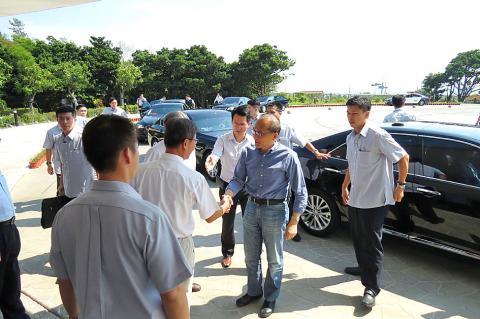The government will not extend the operating life of two of the nation’s nuclear power plants, Premier Lin Chuan (林全) said yesterday, while promising that electricity supply would remain stable.
During a visit to the Taipower Exhibit Center to meet with residents of New Taipei City — where the two plants are — to discuss issues such as dealing with nuclear waste, Lin said that the Jinshan Nuclear Power Plant in Shihmen District (石門) and the Guosheng Nuclear Power Plant in Wanli District (萬里) would be phased out according to the government’s schedule.
According to the schedule, the No. 1 reactor at the Jinshan plant is to shut down on Dec. 5, 2018, followed by the phasing out of the No. 2 reactor on July 15, 2019; and the Guosheng plant’s No. 1 and No. 2 reactors are to end operations on Dec. 27, 2021, and March 14, 2023, respectively.

Photo: Yu Chao-fu, Taipei Times
Lin sparked controversy in June when he said consideration should be given to restarting the first reactor at the Jinshan plant to ensure electricity supply during the peak summer season.
Lin yesterday said that one of the two reactors at each plant are already out of service and the government is pushing to transform the nation’s power supply structure.
He said that several options are available to ensure a stable supply of electricity.
“Currently, there does not seem to be a problem,” he said.
The first reactor at the Jinshan facility has been suspended since December 2014 after it underwent major maintenance. One of the reactors at the Guosheng plant has been out of service since April, when it also underwent major maintenance, but encountered a glitch in its electrical system.
Taiwan has three active nuclear facilities.
According to the policy of President Tsai Ing-wen’s (蔡英文) administration to create a nuclear-free homeland, Taiwan’s three operational plants are scheduled to be decommissioned by 2025, while the nearly completed Fourth Nuclear Power Plant in Gongliao District (貢寮), New Taipei City, is to remain mothballed.
Nuclear power has traditionally accounted for nearly 20 percent of Taiwan’s electricity production, raising questions about what will replace it when it is phased out.

EUROPEAN TARGETS: The planned Munich center would support TSMC’s European customers to design high-performance, energy-efficient chips, an executive said Taiwan Semiconductor Manufacturing Co (TSMC, 台積電), the world’s largest contract chipmaker, yesterday said that it plans to launch a new research-and-development (R&D) center in Munich, Germany, next quarter to assist customers with chip design. TSMC Europe president Paul de Bot made the announcement during a technology symposium in Amsterdam on Tuesday, the chipmaker said. The new Munich center would be the firm’s first chip designing center in Europe, it said. The chipmaker has set up a major R&D center at its base of operations in Hsinchu and plans to create a new one in the US to provide services for major US customers,

The Ministry of Transportation and Communications yesterday said that it would redesign the written portion of the driver’s license exam to make it more rigorous. “We hope that the exam can assess drivers’ understanding of traffic rules, particularly those who take the driver’s license test for the first time. In the past, drivers only needed to cram a book of test questions to pass the written exam,” Minister of Transportation and Communications Chen Shih-kai (陳世凱) told a news conference at the Taoyuan Motor Vehicle Office. “In the future, they would not be able to pass the test unless they study traffic regulations

‘A SURVIVAL QUESTION’: US officials have been urging the opposition KMT and TPP not to block defense spending, especially the special defense budget, an official said The US plans to ramp up weapons sales to Taiwan to a level exceeding US President Donald Trump’s first term as part of an effort to deter China as it intensifies military pressure on the nation, two US officials said on condition of anonymity. If US arms sales do accelerate, it could ease worries about the extent of Trump’s commitment to Taiwan. It would also add new friction to the tense US-China relationship. The officials said they expect US approvals for weapons sales to Taiwan over the next four years to surpass those in Trump’s first term, with one of them saying

‘COMING MENACINGLY’: The CDC advised wearing a mask when visiting hospitals or long-term care centers, on public transportation and in crowded indoor venues Hospital visits for COVID-19 last week increased by 113 percent to 41,402, the Centers for Disease Control (CDC) said yesterday, as it encouraged people to wear a mask in three public settings to prevent infection. CDC Epidemic Intelligence Center Deputy Director Lee Chia-lin (李佳琳) said weekly hospital visits for COVID-19 have been increasing for seven consecutive weeks, and 102 severe COVID-19 cases and 19 deaths were confirmed last week, both the highest weekly numbers this year. CDC physician Lee Tsung-han (李宗翰) said the youngest person hospitalized due to the disease this year was reported last week, a one-month-old baby, who does not